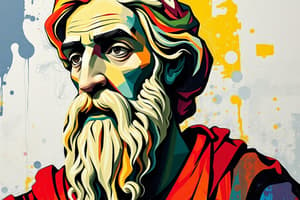Podcast
Questions and Answers
How does David Hume describe the self?
How does David Hume describe the self?
- A unity of identity and perception
- A bundle of perceptions and sensations (correct)
- An imaginative construct based on societal norms
- A fixed entity shaped by experiences
What does Gilbert Ryle assert about the nature of the self?
What does Gilbert Ryle assert about the nature of the self?
- The self exists independently of behavior
- The self is eternal and unchanging
- The self is identified through behavioral patterns (correct)
- The self is a product of religious beliefs
According to Paul and Patricia Churchland, what is inseparable from the self?
According to Paul and Patricia Churchland, what is inseparable from the self?
- The cognitive mind
- The physical brain (correct)
- The social environment
- The emotional experiences
What does Maurice Merleau-Ponty mean by 'embodied subjectivity'?
What does Maurice Merleau-Ponty mean by 'embodied subjectivity'?
Immanuel Kant believes the self plays what role in our experiences?
Immanuel Kant believes the self plays what role in our experiences?
What does the sociological perspective suggest about the self?
What does the sociological perspective suggest about the self?
How does modernization affect the concept of the self, according to the provided content?
How does modernization affect the concept of the self, according to the provided content?
Which issue is associated with the delocalization of the self in modern society?
Which issue is associated with the delocalization of the self in modern society?
What does the term 'philosophy' literally mean?
What does the term 'philosophy' literally mean?
What is the primary focus of Socrates' philosophy?
What is the primary focus of Socrates' philosophy?
According to Plato, a follower of truth and wisdom will:
According to Plato, a follower of truth and wisdom will:
Which philosopher suggested that the soul is the essence of a person?
Which philosopher suggested that the soul is the essence of a person?
What concept is associated with René Descartes?
What concept is associated with René Descartes?
What did John Locke mean by 'tabula rasa'?
What did John Locke mean by 'tabula rasa'?
What does St. Augustine emphasize in his philosophy concerning the body and soul?
What does St. Augustine emphasize in his philosophy concerning the body and soul?
What method did Socrates develop to foster self-knowledge?
What method did Socrates develop to foster self-knowledge?
What does dehumanization of self refer to?
What does dehumanization of self refer to?
According to Nietzsche, how is the self defined?
According to Nietzsche, how is the self defined?
What is a key aspect of the post-modern view of the self?
What is a key aspect of the post-modern view of the self?
How is the self created according to the social construct view?
How is the self created according to the social construct view?
What does Nietzsche suggest about transforming the self?
What does Nietzsche suggest about transforming the self?
What role do memories play in self-creation?
What role do memories play in self-creation?
According to Mead, the conception of self emerges from what?
According to Mead, the conception of self emerges from what?
What concept does 'struggling with cultural hassles' relate to in self-creation?
What concept does 'struggling with cultural hassles' relate to in self-creation?
What is the primary function of the 'Me' in the concept of self?
What is the primary function of the 'Me' in the concept of self?
At what stage do children start to mimic those around them, according to Mead's stages of development?
At what stage do children start to mimic those around them, according to Mead's stages of development?
Which component of self emphasizes an individual's interaction with societal attitudes?
Which component of self emphasizes an individual's interaction with societal attitudes?
What does enculturation refer to?
What does enculturation refer to?
Which perspective highlights the significance of genes in cultural development?
Which perspective highlights the significance of genes in cultural development?
In William James' distinction of self, what does the 'I' self refer to?
In William James' distinction of self, what does the 'I' self refer to?
Which age range corresponds to the Game Stage of self-development according to Mead?
Which age range corresponds to the Game Stage of self-development according to Mead?
What aspect of self-awareness allows individuals to assume responsibility for their conduct?
What aspect of self-awareness allows individuals to assume responsibility for their conduct?
Which component of the self-concept represents an individual's perception of who they want to be?
Which component of the self-concept represents an individual's perception of who they want to be?
What does Carl Rogers emphasize as the driving force behind human behavior?
What does Carl Rogers emphasize as the driving force behind human behavior?
Which part of Freud's personality theory is characterized as being present from birth and operating on the pleasure principle?
Which part of Freud's personality theory is characterized as being present from birth and operating on the pleasure principle?
How is global self-esteem primarily defined?
How is global self-esteem primarily defined?
Which principle does the ego operate on?
Which principle does the ego operate on?
At what age does the superego typically begin to emerge?
At what age does the superego typically begin to emerge?
Which type of self-esteem is determined by temporary feelings linked to specific situations?
Which type of self-esteem is determined by temporary feelings linked to specific situations?
What is the primary role of the superego in Freud's model?
What is the primary role of the superego in Freud's model?
Flashcards are hidden until you start studying
Study Notes
Philosophy of Self
- Philosophy derives from Greek words "Philo" (love) and "Sophia" (wisdom), referring to the pursuit of knowledge and rational inquiry regarding human existence and the world.
Key Philosophers and Their Views
- Socrates: First martyr of education; emphasized "know thyself." Stressed happiness as life's goal and used introspection for self-understanding through the Socratic method.
- Plato: Socrates' student; aligned with knowing oneself leads to moral behavior and truth.
- Aristotle: Viewed body and soul as unified; defined the soul as the essence of the self.
- St. Augustine: United Plato's ideas with Christianity; stated "I am doubting, therefore I am" and saw the soul as defining the individual.
- Rene Descartes: Formulated "I think, therefore I am," asserting self-conscious thought as proof of existence and identity.
- John Locke: Believed the self is conscious and formed from experiences; introduced the idea of the mind as "tabula rasa."
- David Hume: Proposed there is no self, suggesting that identity is merely a collection of experiences and perceptions.
- Gilbert Ryle: Defined the self through behavior; encapsulated in "I act, therefore I am."
- Paul and Patricia Churchland: Argued the brain constitutes the self, dismissing the existence of the mind as a separate entity.
- Maurice Merleau-Ponty: Emphasized subjectivity in self-awareness, indicating the self cannot be fully objectified.
- Immanuel Kant: Claiming we construct the self, posited that it organizes perceptions to create a coherent reality.
Sociological Perspective of Self
- Self-concept is influenced by social settings; it cannot be developed in isolation.
- Modernization produces a delocalized self, leading to unique identity searches and potential alienation.
- Clifford Geertz: Asserted modern identity struggles are crucial and intrinsically linked to societal contexts.
- Proposed solutions include dismantling repressive structures that obscure self-awareness.
Self as Friction & Postmodern Views
- Frederick Nietzsche: Characterized the self as a metaphor for individual actions and representations of abstract concepts.
- The self is dynamic, akin to a narrative encompassing both written and unwritten stories, including digital identities created online.
Mead’s Theory of Self
- George Herbert Mead: Defined the self as emerging through social interaction, consisting of "I" (individual response) and "Me" (social perceptions).
- Three Stages of Development:
- Preparatory Self: Mimicking behavior (0-2 years)
- Play Stage: Role-playing (2-6 years)
- Game Stage: Following rules in interactions.
Anthropological Perspective of Self
- Anthropology examines the self from various cultural, historical, and biological angles, reinforcing that culture significantly impacts individual identity formation.
Psychological Perspective of Self
- The self is framed as a cognitive construction reflecting personal experiences and identity.
- William James: Differentiated "I" (self-awareness) and "Me" (empirical self), further divided into material, social, and spiritual selves.
- Carl Rogers: Emphasized the self as flexible, developing through interactions with others. His self-concept consists of self-image, ideal self, and self-esteem.
- Sigmund Freud: Introduced the structural model of personality:
- Id: Primitive urges, guided by the pleasure principle.
- Ego: Balances desires with reality.
- Superego: Emerges with social norms and ethics around age five.
Studying That Suits You
Use AI to generate personalized quizzes and flashcards to suit your learning preferences.




